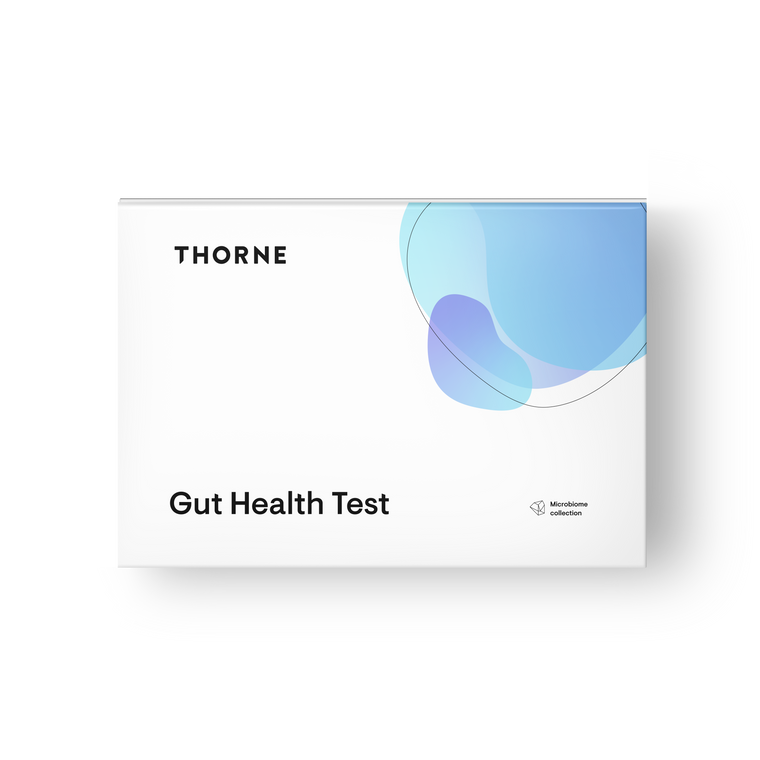
Gut Health 101
Why is Gut Health important?
The gut microbiome is the internal environment of the GI tract in which tens of trillions of microorganisms, including bacteria, fungi, archaea, and viruses all live together. And while the gut microbiome is influenced by demographic factors like age, genetics, and where a person lives, the gut microbiome’s composition is also greatly impacted by what comes into it at its entrance and what eventually exits it. Because the GI tract plays such a key role in multiple bodily functions, including digestion, vitamin synthesis, neurotransmitter support, and immune function, it’s important to keep this intricate system in balance to maintain the optimal function of these vital processes.
Thorne’s Gut Health Test takes a deep dive into your gut health and provides personalized recommendations for lifestyle, diet, and nutritional supplementation based on your unique gut biome composition.
NEW: A Novel Wipe for Easy Sample Collection
At Thorne, the cutting-edge technology we use has enabled us to introduce a new microbiome wipe that gently collects a stool sample with less fuss and mess. This one-of-a-kind wipe makes the collection process as simple as your regular bathroom routine. To improve the user experience of stool collection, the sample collection kit includes a dissolvable wipe in which the sample taken is dissolved in a DNA-stabilizing solution. The solution that contains the biological sample is sent to the sequencing lab in a sealable container.
How the measured microbes impact your health
Thorne’s Gut Health Test is sequenced using “whole genome shotgun sequencing,” which uses next-generation metagenomic sequencing that identifies and measures the DNA of every microorganism present in the stool sample, thus providing a detailed analysis of your gut’s health.
The test focuses on five foundational gut-health pillars that have been designated as such by the Institute for Functional Medicine:
Intestinal Permeability
Intestinal permeability is the measure of what types of material pass through your intestinal wall and how easily they do it. If the cells in the gut’s walls lose their “tight junctions,” then the gut becomes more permeable and allows more bacteria and toxins to pass from your gut into your bloodstream. The measure of your gut’s permeability will help you understand your risk for “leaky gut” based on the microorganisms present in your gut that can cause dysbiosis, or structural damage to the GI lining, or changes in regulation and signaling mechanisms.
Gut Dysbiosis
An optimal balance of the bacteria in your gut has a positive effect on your overall wellness. When the bacteria are not in balance, a condition known as dysbiosis, you can begin to experience undesirable GI symptoms. The Gut Health Test analyzes the balance of the good, bad, and conditional bacteria levels present in your gut and their research-backed associations to health, wellness, and disease conditions.
Digestion
Proper digestive health facilitates your body’s optimal absorption of nutrients. Age, prescription medications, over-the-counter products, surgery, and injuries can adversely impact your digestive capabilities. Learn whether your microbiome is populated with the right types of bacteria and in the right quantities to properly support the digestion of the food you eat. Poor digestion leads to undesirable symptoms like gas, bloating, diarrhea, and constipation.
Inflammation
An imbalanced gut biome can cause inflammation in the entire body. Understand your risk for inflammation and patterns of inflammatory activity based on the microorganisms that are present in your gut and their effects on whole-body inflammation.
Nervous System
An imbalanced gut biome can adversely affect your enteric nervous system – your “gut-brain axis” – which can adversely impact mental capacity, cognitive function, and mood. Learn how your bacterial makeup influences the real-time communication between your gut and your brain, which impacts your autonomic and central nervous systems, nutrient metabolism, sleep, mood, food cravings, stress levels, and more.
In addition to the five foundational gut pillars, the Gut Health Test measures these other key indicators of your gut’s health:
Pathogens
Your sample is screened for the bacteria, viruses, and parasites that can cause adverse GI symptoms or disease conditions.
Total Fungi
Learn if your gut has a normal level of fungi present or if you are at risk for developing a fungal overgrowth.
Short-Chain Fatty Acids
This measure analyzes the bacteria and genes that regulate your gut’s production of short-chain fatty acids (SCFAs). Your gut’s capability to produce the SCFAs is important for helping to maintain normal inflammation and immune function.
Diversity
Know the quantity and the quality of the various species that inhabit your gut. A lower beta diversity score indicates that the bacterial population of your gut is similar to others who have a healthy gut.
Probiotics
Review a quantitative analysis of your current probiotic levels and receive a list of commercially available probiotics to guide your supplementation choices or to help determine if your current probiotic supplementation is working for you.
Micronutrients
Learn your gut’s capability to produce B vitamins based on the abundance of B vitamin-producing bacteria present. B vitamins are essential for energy production, metabolism, blood cell production, immune function, and more.
Immune Readiness
Know your body’s readiness for an optimal immune response to foreign pathogens – bacteria, parasites, and viruses – based on your microbiome’s ecosystem.
The Science
-
Rich R, ed. The microbiota in immunity and inflammation. In: Clinical Immunology: Principles and Practice 5th ed. St. Louis, Mo.: Elsevier; 2019. https://www.clinicalkey.com. [Accessed August 1, 2019.]
-
Said H, ed. Diet effects on gut microbiome composition, function, and host physiology. In: Physiology of the Gastrointestinal Tract 6th ed. San Diego, Calif.: Elsevier; 2018. https://www.clinicalkey.com. [Accessed August 1, 2019.]
-
Shin J, Warren C. Prevention and treatment of recurrent Clostridioides difficile infection. Curr Opin Infect Dis 2019;32:1-8.
-
Almeida A, Mitchell A, Boland M, et al. A new genomic blue print of the human gut microbiota. Nature 2019;568:499-518.
-
Nagao-Kitamoto H, Kitamoto S, Kuffa P, et al. Pathogenic role of the gut microbiota in gastrointestinal diseases. Intest Res 2016;14:127-138.
-
Francino M. Antibiotics and the human gut microbiome: dysbioses and accumulation of resistances. Front Microbiol 2016;6:1-11.
-
Ramos G, Papadakis K. Mechanisms of disease: inflammatory bowel diseases. Mayo Clin Proc 2019;94:155-165.
-
Pittayonon R, Lau J, Yuan Y, et al. Gut microbiota in patients with irritable bowel syndrome ‐ a systematic review. Gastroenterology 2019; 157:97-108.
-
Clostridium difficile-induced diarrhea. Merck Manual Professional Version. https://www.merckmanuals.com/professional/infectious-diseases/anaerobic-bacteria/clostridium-difficile-induced-diarrhea. [Accessed July 31, 2019]
-
Hopkins R, Wilson R. Treatment of recurrent Clostridium difficile colitis: a narrative review. Gastroenterol Rep 2018;6:21-28.
-

Gut Health Test | Thorne
Gut health is a foundation for wellness. Thorne’s gut microbio...
-

Collecting your stool sample | Health Tests | Thorne
Remember to activate your test and complete your health profil...
-

3 Reminders for Your Gut Health Test
Watch this video for three important reminders as you prepare ...
- Affiliate Link:
- https://s.thorne.com/Fmv9Y











